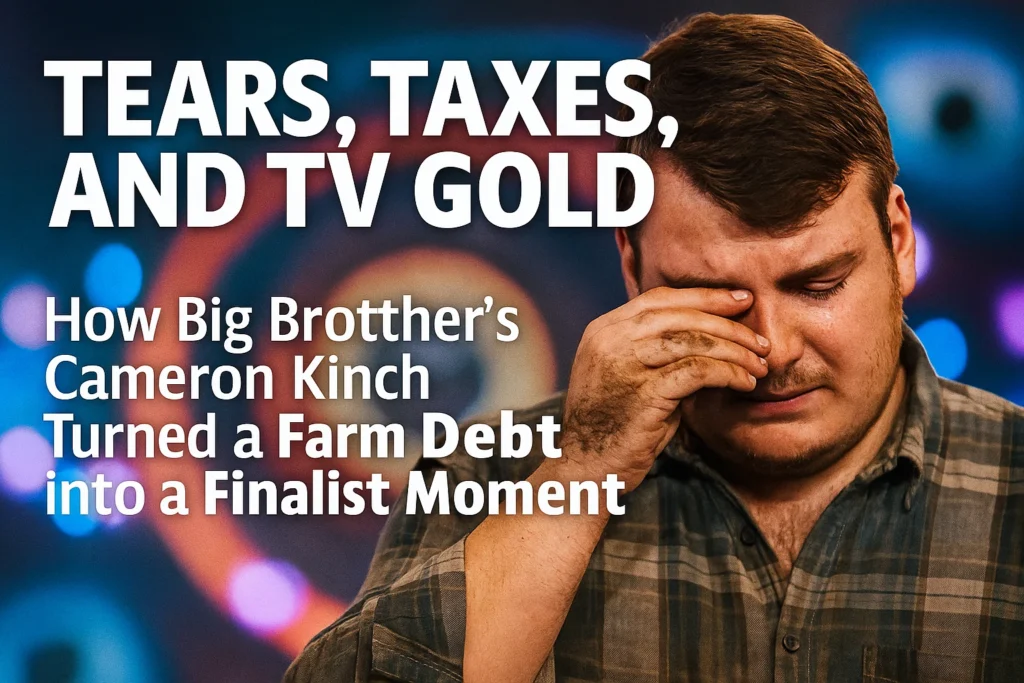Tears, Taxes, and TV Gold: How Big Brother’s Cameron Kinch Turned a Farm Debt into a Finalist Moment

I. The Twist That Broke the Internet
When Big Brother UK’s latest twist aired — an eyeball-themed challenge deciding who’d walk straight into the final — fans expected strategy. What they got was sincerity.
Cameron Kinch, a 22-year-old farmer from Taunton, broke down in tears after securing the coveted pass to the final. It wasn’t the victory itself that stopped viewers scrolling; it was what followed. Between gasps and sobs, Cameron confessed the £100,000 prize wasn’t about fame — it was about saving his family’s farm.
Clips of the moment flooded X (formerly Twitter). Some fans called it “the most genuine Big Brother scene in years.” Others wondered if the producers had gone too far. As one post put it: “It’s hard to know what’s real anymore — but I felt that.”
II. Farm, Family, and Fear
Before the tears, Cameron was one of this season’s quieter players — polite, practical, and always worrying about something back home. His pre-show Q&A revealed why: he’s the latest generation trying to keep a Somerset family farm afloat amid soaring costs and looming inheritance taxes.
In an earlier diary-room segment, Cameron admitted he “loses sleep over” the thought of losing the farm to taxes. GB News later ran a clip headlined “Farmer Cameron breaks down over family tax burden”, showing housemates comforting him as he cried.
For Cameron, the Big Brother prize fund wasn’t a dream; it was a lifeline. That reality — real bills, real land, real pressure — gave his victory emotional gravity. It wasn’t just competition TV anymore; it was the economic story of rural Britain, packaged into primetime drama.
III. When Reality Gets Too Real
Big Brother has always thrived on vulnerability — from Nasty Nick’s scheming to Jade Goody’s raw honesty. But Cameron’s breakdown reopened an old debate: where’s the line between empathy and exploitation?
Reality-TV producers know that real emotion drives engagement. Viewers crave authenticity in a genre built on performance. Cameron’s confession ticked every emotional box — hardship, family, redemption — yet felt uncomfortably real.
As Farmers Guardian put it, his “tearful explanation of farm-tax fears brought farming issues into Britain’s living rooms.” But as social feeds lit up, so did questions about how much pain TV should platform for ratings.
IV. Fan Divide: Emotional Honesty or Emotional Gameplay?
The reaction was split clean down the middle.
Team Cameron (Heartfelt): “He’s pure gold. That’s what real people sound like when they’re desperate,” wrote one viewer.
Team Skeptic (Cynical): “Producers know exactly what they’re doing. Every tear equals trending.”
🗳️ Was Cameron’s emotional reveal fair game or emotional gameplay?
✅ Fair Game — It’s his truth.
❌ Emotional Play — Too manipulative.
🤷 Not sure — It’s reality TV!
Still, the numbers speak for themselves. Betting odds swung dramatically in his favor the night after the episode aired, cementing Cameron as a frontrunner. Whether out of sympathy or strategy, Britain was now firmly watching the farmer who cried.
V. The Bigger Picture: Why We Still Crave ‘Real’
In a culture drowning in curated content, Cameron’s shaky voice and dirt-under-the-nails authenticity hit differently. It reminded viewers why Big Brother, two decades on, still matters: it holds up a mirror to everyday Britain.
Farmers rarely get primetime empathy. Cameron’s vulnerability bridged that gap — not through grand speeches, but through quiet honesty.
VI. The Price of Being Real
As the finale looms, one question lingers: did Cameron’s tears secure him a win, or simply show the high emotional price of modern reality fame?
Either way, he’s turned taxes into TV gold — and, for once, Britain’s reality-TV heart beats to the rhythm of real life.




